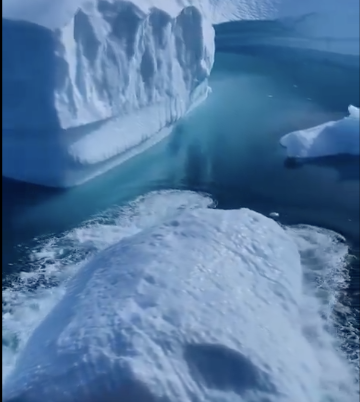OMG! Let’s all panic!!!
The Greenland ice cap is losing around 30 MILLION tonnes of ice an hour due to the climate crisis – 20% MORE than what scientists originally thought.
— Mike Hudema (@MikeHudema) November 19, 2024
No time to waste. Stopfossifuels. #ActOnClimate #climate #energy #renewables #go100re pic.twitter.com/4KtIyzOnph
Slow your roll, pal. Let’s do the math
The Greenland ice sheet holds an impressive 2.9 million gigatons of ice. To put that into perspective, 1 gigaton equals 1 billion tons, so we’re talking about 2.9 million billion tons of ice.
Current Ice Loss:
Recent data suggests Greenland loses about 30 million tons of ice every hour. While this sounds alarming, let’s break it down:
- Daily Loss: 30 million tons/hour × 24 hours = 720 million tons/day
- Annual Loss: 720 million tons/day × 365 days/year = 262.8 billion tons/year
Here’s where perspective kicks in. At this rate, the entire Greenland ice sheet would take over 11,035 years to melt completely.
Impact on Sea Levels
Each 360 gigatons of ice lost from Greenland raises global sea levels by about 1 millimeter. At the current rate of ice loss, this translates to:
- Annual Sea Level Rise: Approximately 0.73 mm/year from Greenland ice melt alone.
- Long Term Impact: This would contribute to about 1 foot of sea level rise every 417.5 years, if other factors like Antarctic ice loss are not considered.
While the figures of ice loss sound enormous, the actual impact over centuries, rather than lifetimes, suggests that the situation, although serious, is manageable. The rate of ice melt could change due to climate feedbacks, but currently, the numbers don’t justify panic.
Hi again, Mike. 👋
— Chris Martz (@ChrisMartzWX) November 20, 2024
Let’s go over this for what’s now a third time. Maybe it will sink in.
The Greenland ice sheet contains about 2.9 million gigatons (Gt) of ice. 🧊
Using the conversion factor that 1 Gt = 1 billion tons, this means that the ice sheet has roughly 2.9 million… https://t.co/JOJaosBIvW
Reading the Thread on this post is interesting and even more comforting if you’re one of those people who are freaked out by the possibility of trees replacing ice.
